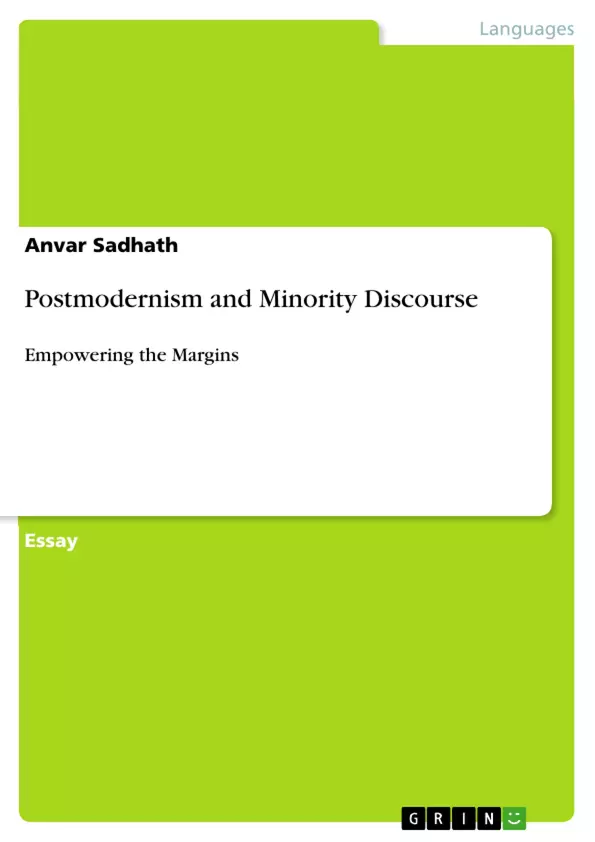The awakening of the voices of the marginalized classes especially the ethnic, racial minorities and other oppressed classes in recent years is to be understood as part of the overall shift of paradigm in cultural discourses that took place with the advent of postmodernism and related developments. The manifest forms of changes in this regard include a number of revolutionary practices initiated by literary and cultural critics and writers in the interest of social change mostly from the third world countries. (The term ‘third world’ is used as “a proper name to a generalised margin”([Spivak 199) and it is to be noted that the general use of the term in the West has ramifications as deep as the old and new varieties of colonialism.
Inhaltsverzeichnis (Table of Contents)
- Empowering the Margins
- Minority Discourse and Postmodernism
- Postmodernism and the Decentring of Culture
- The Anti-foundational Character of Postmodern Thought
- Foucault and the Operation of Power
- Minority Discourse as a Subversive Act
- Postmodernity and New Minorities
Zielsetzung und Themenschwerpunkte (Objectives and Key Themes)
This essay aims to explore the connection between postmodernism and minority discourse, arguing that the rise of postmodern thought provided a crucial context for the empowerment of marginalized groups. It analyzes how postmodernism, with its anti-foundational and anti-authoritarian tendencies, contributed to the decentring of cultural power structures, giving voice to those previously excluded from the dominant narratives.
- Postmodernism as a catalyst for the emergence of minority discourse
- The role of anti-foundational philosophy in challenging dominant narratives
- The impact of Foucault's ideas about power and its operation on minority studies
- The complex relationship between postmodernity, globalization, and the formation of new minorities
- The limitations of postmodern thought in addressing real-world oppression
Zusammenfassung der Kapitel (Chapter Summaries)
- Empowering the Margins: This introductory chapter establishes the context for the essay, highlighting the emergence of minority discourse as a response to the dominant cultural paradigms. It introduces the key concepts of postmodernism, marginality, and minority discourse, arguing that these phenomena are interconnected.
- Minority Discourse and Postmodernism: This chapter delves into the relationship between postmodernism and minority discourse, analyzing how postmodern theories, particularly their anti-foundational character, create space for the expression of marginalized voices. The chapter also discusses the concept of "fixity" and how it contributes to the construction of otherness.
- Postmodernism and the Decentring of Culture: This chapter explores the impact of postmodernism on cultural power structures. It discusses how postmodern thought challenges the traditional centres of European culture, philosophy, and metaphysics, leading to a more inclusive and diverse cultural landscape.
- The Anti-foundational Character of Postmodern Thought: This chapter examines the anti-foundational nature of postmodern thought, tracing its roots to thinkers like Nietzsche and Lyotard. It explores the critique of "grand narratives" and the celebration of "little narratives," highlighting the implications for minority discourse.
- Foucault and the Operation of Power: This chapter focuses on Michel Foucault's theories of power and their impact on minority studies. It discusses Foucault's analysis of disciplinary power and its role in the surveillance and control of marginalized groups, emphasizing the importance of understanding power relations in the context of minority discourse.
- Minority Discourse as a Subversive Act: This chapter examines the subversive nature of minority discourse, highlighting its role as a challenge to the dominant power structures. It discusses how minority writers use their work to resist dominant narratives and reclaim their identities.
- Postmodernity and New Minorities: This chapter explores the emergence of new minorities in the postmodern world, particularly in the context of globalization and the commodification of culture. It discusses how these new minorities face different forms of oppression and how they engage in resistance.
Schlüsselwörter (Keywords)
The central keywords and focus topics of this essay include: postmodernism, minority discourse, anti-foundationalism, power relations, cultural hegemony, marginality, otherness, grand narratives, little narratives, disciplinary power, and globalisation.
Frequently Asked Questions
What is the connection between postmodernism and minority discourse?
Postmodernism acts as a catalyst for minority discourse by challenging dominant cultural power structures. Its anti-foundational nature creates space for marginalized voices that were previously excluded from mainstream narratives.
What are "grand narratives" and "little narratives"?
"Grand narratives" are overarching, universal stories (like European history or metaphysics) that claim absolute truth. Postmodernism critiques these and celebrates "little narratives," which are local, diverse, and representative of specific minority experiences.
How did Michel Foucault influence minority studies?
Foucault analyzed how power operates through discipline, surveillance, and control. His work helps minority studies understand how power relations shape the identities and oppression of marginalized groups.
What does "anti-foundationalism" mean in this context?
Anti-foundationalism is a philosophical stance that rejects the idea of a single, objective "foundation" for knowledge or truth. This allows for multiple perspectives and validates the lived realities of minorities.
How does globalization affect the formation of new minorities?
Globalization and the commodification of culture lead to the emergence of "new minorities" who face different forms of oppression and engage in unique subversive acts to reclaim their identities.
- Quote paper
- Anvar Sadhath (Author), 2014, Postmodernism and Minority Discourse, Munich, GRIN Verlag, https://www.grin.com/document/267140



